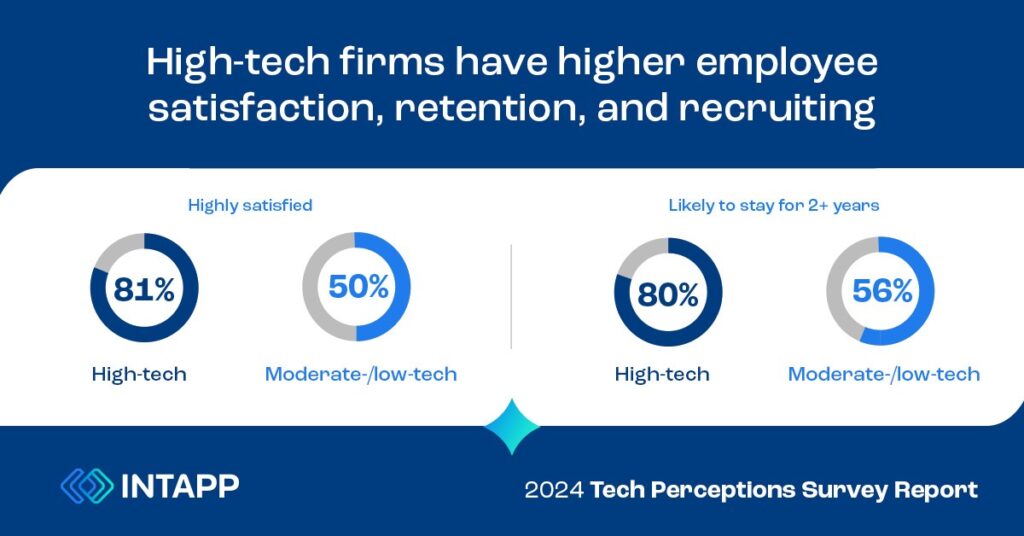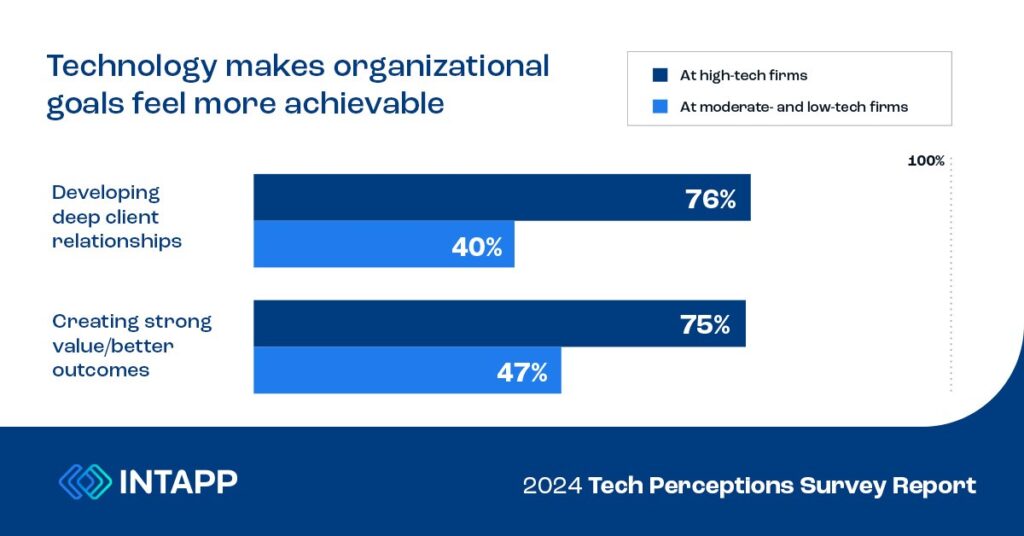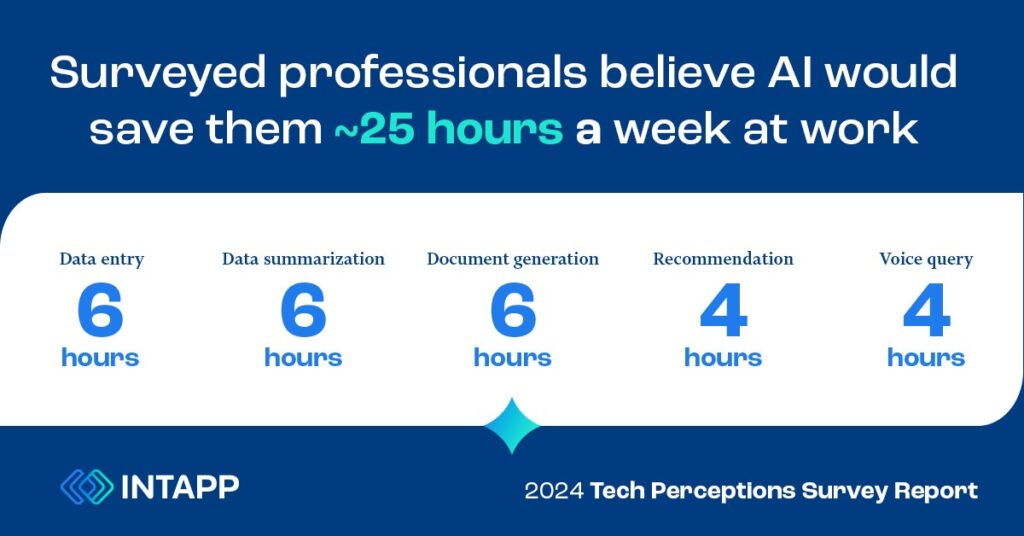Access to AI technology impacts employee satisfaction and success
Despite many new advancements in AI, some firms are still hesitant to adopt the technology. This is understandable to an extent, since some AI and automation tools can be both expensive and time consuming to implement. Leadership may be unwilling to invest in this new technology, instead opting for familiar tools and processes.
However, this cautious approach towards adopting new technology can actually have a significant, negative impact on a firm’s employees. According to the Intapp 2024 Tech Perceptions Survey, only 50% of respondents from moderate- and low-tech firms were highly satisfied at their jobs, as compared to 81% of respondents from high-tech firms.
A lack of AI and automation tools similarly impacts a firm’s retention and attraction rates. Only 49% of respondents at moderate- and low-tech firms were highly likely to recommend their firm as a good place to work, and only 56% were highly likely to stay at their firm for at least the next 2 years. On the other hand, 77% of respondents at high-tech firms were highly likely to recommend their firm, and 80% said they were highly likely to stay.
Why is there such a discrepancy between the satisfaction rates at high-tech firms and moderate- and low-tech firms? We’ll explore the expectations that employees have around AI and the impact AI has on their performance and satisfaction.

Personal use of AI technology
Advancements in AI have skyrocketed in recent years, and more AI tools are available to the general public than ever before. In fact, 59% of survey respondents reported that they’re already using AI at home.
Tools like ChatGPT, Microsoft Copilot, and voice assistants can help people accomplish a number of various tasks in their personal lives. For example, they can ask their voice assistant to remind them of an upcoming doctor’s appointment, or they can use ChatGPT to help them draft an email. And users are seeing a huge difference: 77% of respondents stated that technology makes them more productive in their personal lives.
Just as it helps them at home, many professionals believe AI can help them improve productivity in the workplace. A total of 91% of survey respondents stated that they want to use AI for tasks like data entry, data summarization, document generation, recommendations, and voice queries. By doing so, professionals believe they will be better positioned to achieve both organizational and individual career goals.
So is this belief justified? We surveyed employees at both high-tech firms and moderate- and low-tech firms to learn how much of an impact AI really has on a professional’s ability to achieve organizational and individual career goals.
Organizational goals
In terms of achieving organizational goals, our survey shows that employees at high-tech firms have a clear advantage over those at moderate- and low-tech firms. For example, 80% of professionals at high-tech firms said they feel successful in developing expertise in the field, while 76% feel successful in both developing deep client relationships and working efficiently.
But at moderate- and low-tech firms, only 49% felt successful in developing expertise, while only 40% and 47% felt successful in developing client relationships and working efficiently, respectively.

This huge discrepancy in success rates might seem shocking to some firm leaders — but they need to consider the many AI-driven benefits their teams are missing out on.
AI tools offer capabilities that can help professionals successfully achieve organizational goals. For example, professionals can use AI to analyze their relationship data and quickly generate targeted email drafts. AI can also create meeting summaries that provide key highlights, so teams can make informed decisions faster without having to read through entire meeting transcripts.
AI-powered platforms can also reduce data siloes to support better knowledge sharing. Often, firm information is stored across multiple applications, from personal documents and spreadsheets to client relationship management, practice management, and financial management systems. But a connected platform can use AI to integrate and consolidate that data, so teams can easily access, update, and collaborate on documents as needed in one place.
AI can also greatly improve data quality. Firms can set algorithm parameters, allowing the AI software to catch errors on incoming data, repair incomplete and outdated existing data, and ensure all data is up to their standards.
Ultimately, AI can help professionals access information and generate content more efficiently and accurately than ever before, allowing them to make better-informed decisions and respond to clients faster.
Individual development goals
AI can also help professionals with their individual career and development goals, including achieving better work/life balance.
As the volume and complexity of new engagements increase, many professionals struggle to keep up with all their tasks. Our survey revealed that nearly 40% of professionals’ work is comprised of manual tasks, such as time entry, that could be automated. Without AI tools to automate these arduous manual tasks, professionals end up working longer hours — often leading to overwhelm and burnout.
On the other hand, professionals who use AI and automation tools to perform manual tasks can save an estimated average of 25 hours a week. More than half of survey respondents believe AI will help them achieve better work/life balance, while more than 60% believe it will give them more time to focus on higher-level work for their clients.

Professionals can also use AI to help them with goals like learning new skills and getting promoted. Users of large language models (LLMs) like ChatGPT can type in prompts such as, “How do I advance to the next position of my career?” and the LLM will pull data from a wide range of sources on the internet to generate a career plan. For example, the LLM might advise the user to expand their network or become certified in a specific skill, depending on what their role is.
This method is much quicker than searching through a search engine manually. Plus, with machine learning, the AI will be better able to determine which data is the most relevant to the user, and can provide creative insights based on the solution’s data model and prompts.
Being able to quickly access relevant information and insights will greatly help professionals figure out their next steps and grow in their careers. And the more knowledge, skills, and confidence your professionals gain, the more value they’ll bring to your firm and clients.
A discrepancy in satisfaction rates
As our survey shows, professionals at low-tech firms don’t feel supported when it comes to organizational and individual development goals. Even the highest-scoring goal (49%) for low-tech firms is significantly less than the lowest-scoring goal (61%) for high-tech firms.
Low-tech firms that ignore low satisfaction rates risk losing their top performers and all the specialized knowledge and deep expertise they possess. Firms with low employee recommendation rates are also likely lose potential talent to competitor firms willing to support their staff with the advanced technology they need to succeed.
High-tech firms are simply more likely to retain and attract not just top talent, but clients as well. AI helps professionals automate tasks and access timely, accurate information — helping them serve their clients faster and focus more on value-driven work. As client satisfaction rates increase at high-tech firms, low-tech firm clients may rethink where they take their business.
Don’t fall behind your competitors and miss out on the benefits AI has to offer. By investing in AI and automation, your firm can retain its best professionals and grow its client base.
Download the Intapp 2024 Tech Perceptions Survey Report to learn more about professionals’ expectations around AI technology.
